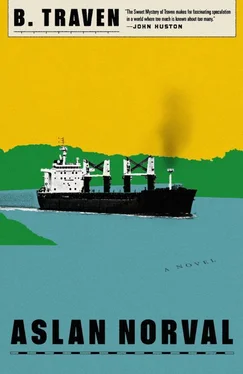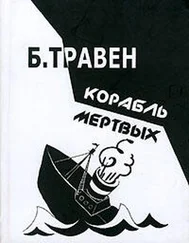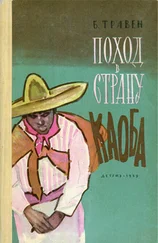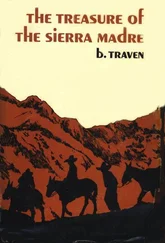“In any case, Holved, I wish you the best of luck.”
“And I wish you the same, Aslan. Oh—by the way, how did you ever come up with the idea of building this canal? Even if I am now involved, sometimes during a sleepless night I still consider it a crazy idea.”
“Maybe. Maybe it’s not so crazy. It depends how you look at it.”
“But someone must have whispered the idea in your ear? Beckford maybe?”
“Beckford? I could die laughing. Him? The ‘honorably discharged Marine Corps sergeant’ as he calls himself? Don’t be ridiculous, Holved. It was my idea. Without any help at all. It really was more of a rebellion against the calcified teachings I received from my female teachers. It was pretty simple. I was twelve and in geography class. The teacher was Miss Johnson. I remember her name perfectly. She showed us the great influence of the two most important canals, the Suez Canal and the Panama Canal, on the economy of many countries. On maps, she showed us how these canals saved the shipping business many thousands of nautical miles and therefore time and money. She pointed out that without the canals, many products would cost double or even triple in London, Paris, New York, and San Francisco. I got up from my seat and asked who owned the canals. Miss Johnson then explained that the canals belonged to the companies that had built and maintained them. Then I asked her whether the countries through which the canals were built, that is, Egypt and Panama in particular, did not have a greater right to the canals than foreign companies. Her response was: these countries receive part of the profit created by the canals and, in addition, certain predetermined sums of indemnization payments. I wasn’t satisfied with the answer. I wanted to know what would happen if one day these countries were to deny ships the right to use the canals to protect their sovereign property rights. Miss Johnson said that could never happen, since those countries were too weak in terms of military and economic power. They would never be able to defend themselves against the superpowers of the U.S., England, France, the Netherlands, Italy, and Belgium. She said that I was to sit down quietly and stop asking questions, as I was disrupting the regular lessons with completely useless questions.
When I got back to my room, I took out an atlas and studied the maps more carefully. I specifically looked at them in terms of existing canals—and canals that still could and should be built. And you know, Holved, since then, geography has been the subject that has interested me most.”
“And you never said a word about all this to me?” asked Holved.
“Why should I have? You never asked me what interested me in school. You’ve also never asked me what I do when I’m alone at home.”
“Sometimes, when I look at you, Aslan, I think I don’t really know you at all and that I don’t know in the least what goes on in your head,” said Holved, scrutinizing not only her face but her whole person.
“You see, my reasons for doing this project are much deeper. Right now, we are helplessly caught in a messed-up and terribly confused ideology that deals almost solely with the possibility of war. Maybe once it goes public, this plan will shake up people’s convictions and give them new ideas.”
“Aslan, you are wonderful, truly amazing. I don’t understand a single word of what you’re saying so eloquently. But I love listening to you. Go on, my dear. Continue. Your voice always enchants me. It’s so soft, such a melodious sound, like—just like—”
“I know. It sounds like a gong made from pure bronze mixed with plenty of gold and silver and with quite a bit of crystal included for good measure. I know. I know everything. Tell me something new! I would prefer that. Something absolutely new. For example, that you love me more than life.”
“That is nothing new. That’s been going on for three years.”
“But you know, Holved, a woman can’t hear it often enough. You say it five hundred times and then a woman will ask you to say it just one more time.”
“All right, then. I’ll say it just one more time: I love you more than ever.”
Holved used the same words as he said goodbye at Idlewild airport to fly to Indonesia. In the meantime, the Atlantic-Pacific Transit Corporation had been lawfully registered as the security act prescribed. Their shares could now be traded on the stock exchange. However, not many shares appeared on the market, since the initial public offering was largely taken. As long as nothing specific of the company’s plans was known you would not expect that the shares changed owners for purposes of speculation. Everyone waited in cases like this. For now, it was not necessary to have new shares registered to offer to the public.
Then a short article appeared in the business section of several newspapers in New York, Boston, Chicago, and San Francisco. It said that the APTC planned to build a great canal, which was expected to make shipping easier and would, most important, contribute to keeping shipping costs low in spite of increasingly expensive logistics.
The people who read this article—mostly bankers and industrial executives—asked, for starters, who the APTC was, since the company was entirely unknown, and who its founders were. These people had little interest in the company’s plans. They were much more interested in finding out whether they could perhaps play the market with the shares of this new company.
Whoever else read the article, thought—if they thought anything at all—that it was a canal somewhere in the interior of the country, probably in the area of the Great Lakes up north. No one paid any attention to the article, since a canal was built every few weeks. Such a canal was often only of local importance and mainly served the interests of a group of industrial enterprises. The article received so little attention that no companies even asked to receive contracts for building materials for the canal.
Though Holved was well-known as a serious and trustworthy businessman in industry and banking circles, he never sought the spotlight. Neither in business nor in society did he try to be the center of attention. He had never been involved in a scandal. Even his divorces had not received any public attention.
Aslan’s case was very different. Several times she had commanded the spotlight; for example, when she had inherited yet another huge fortune and was dubbed “the American princess of inheritances.” It cost Aslan a lot of effort to escape reporters and photographers, but she was always successful. In fact, she was so adept at avoiding the newspaper columns filled with boring society gossip that even her marriage to Holved had remained and would continue to be a secret.
Therefore, it was understandable that more than seventy reporters showed up for a reception she had called in a small conference room of the Waldorf Hotel. The members of the press were greatly interested in the champagne cocktail, but far more excited to find out what Aslan would share with them. The reporters were betting among themselves—and they did not bother to whisper—that Aslan would finally announce the name of her fiancé, and that the lucky man must undoubtedly be one of the five hundred sons of deposed emperors, kings, dukes, counts, and earls offered for twenty thousand dollars on the open market. Not even ten reporters would have shown up had they known that her announcement merely concerned a business affair barely interesting enough to fill a hole in the general text of the newspaper. Meanwhile, the engagement of the “American princess of inheritances” would be enough for half a newspaper page.
The reporters downed their cocktails like water, barely setting down their empty glasses before grabbing another from the server, who looked as sad and serious as an undertaker. You don’t get champagne cocktails every day, especially not made with Madame Cliquot. Not to mention for free. You could hear the reporters clamoring from miles away. It was not ten minutes before the hotel detective appeared in the doorway.
Читать дальше










